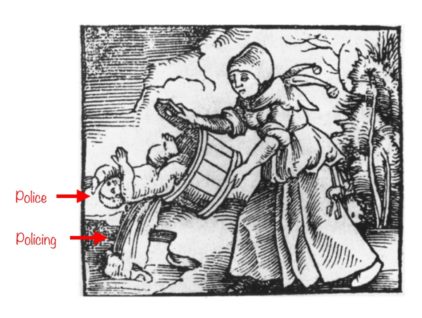Suddenly there is growing support for the idea that Americans ought to reclaim responsibility for protecting themselves and their property. This would be an important step towards becoming fit for liberty once again.
We may be in one of those times when, as Milton Friedman said, the politically impossible becomes the politically inevitable.
That being the case, it’s worth taking a moment to remind ourselves of the two principal ideas in the Declaration of Independence. First, that the purpose of government is to protect rights. Second, that government derives its just powers from the consent of the governed.
Here is what we should have learned from the recent lockdowns: You can’t protect people, or property, without violating rights.
To take just one example, preventing occupational licensing laws is protecting your rights. Enacting occupational licensing laws is attempting to protect you — something that can’t be done without violating the rights of everyone to enter into voluntary agreements. Such laws allowed the government to devastate the economy, and are now being used to prevent its recovery.
Here is what we should have learned from the recent riots: The police aren’t there to protect you. Clearly they can’t, but even if they could, they aren’t required to. It’s been settled law for decades that the police have no duty to protect you unless they’ve taken you into custody. The police are there to clean up after crimes are committed, not to prevent crimes, or to stop crimes that are in progress.
The way to protect rights is pretty straightforward: If you violate someone else’s rights, you get punished. And to the extent that it’s possible, your victim is made whole, at your expense.
Sir Robert Peel, the father of the modern professional police force, noted that
the police are the public and the public are the police; the police being only members of the public who are paid to give full-time attention to duties which are incumbent on every citizen.
That is, the police can’t (and shouldn’t) do anything that any individual citizen can’t (or shouldn’t) do. They’re just supposed to be better at a certain skill set (examining a crime scene, collecting evidence, maintaining a chain of custody, making arrests, and so on) than the typical member of the public, in the same way that a plumber or an electrician is better at his job than most people are.
This is where the police come in, as an arm of the courts, which need to make use of that particular skill set.
The trouble starts when the police also become an arm of the legislative and executive branches, which use them, not to protect rights (by punishing people who have violated someone else’s rights), but to enforce policies (often by punishing people who haven’t actually done anything except peacefully exercise their rights).
The latter is what we normally mean by ‘policing’ — using violence to promote ‘order’ and ‘morality’ as defined by the majority, without the consent of the minority.
This kind of ‘policing’ violates both of the principal ideas in the Declaration. Instead of being protected, rights are sacrificed to other considerations — moral preferences, traditions, ‘public health’, and so on. And the will of the majority replaces the consent of the governed. This isn’t government. It’s husbandry.
So, how can we make the best use of this once-in-a-lifetime opportunity to change the bathwater, without throwing out the baby in the process?
The police have a job to do, and it’s an important one. It’s just not the job they’ve been doing. And the job they shouldn’t be doing — ‘policing’ — is the one that takes nearly all of the money, and causes nearly all of the problems.
So what we want to do isn’t defund the police. We want to defund policing. How can we do that? What practical measures could we take right away, that would make significant improvements?
First, we could preclude the government from appearing as the prosecutor in a criminal case.
That is, if there’s no victim, there’s no crime. As a cleanup measure, we would drop any RSAs that would require the government (or ‘the people’, or whatever other euphemism might be used) to make a criminal complaint. But that could be done more slowly. If complaints can’t be filed, it doesn’t matter all that much whether laws requiring those complaints are still on the books for a few extra months.
Second, we could make police departments operate more like fire departments. When firefighters are needed, they are summoned. If no one summons them, they train, study, prepare… and wait. And that’s what police officers — or ‘crimefighters’ — should be doing. No summons, no victim. No victim, no crime. No crime, no need for police involvement.
Third, we could replace qualified immunity with a fiduciary standard — which is really just the idea that presumption of innocence applies before you get to court, as well as after, so if someone is going to get hurt in an encounter between the police and a suspect, it should be the police, and not the suspect.
So why haven’t these things been done already? It’s because we have public officials who believe that crimes don’t require victims, and that suspects don’t deserve the presumption of innocence… and more importantly, who believe that the purpose of government is to encode their personal preferences into statutes that violate rather than protect rights, ignoring the need for consent, and using the police as their enforcers.
Ultimately, those are the people who need to be defunded, or maybe just defenestrated. Blaming the police for what’s going on is like getting angry at a ventriloquist’s dummy for insulting you.

